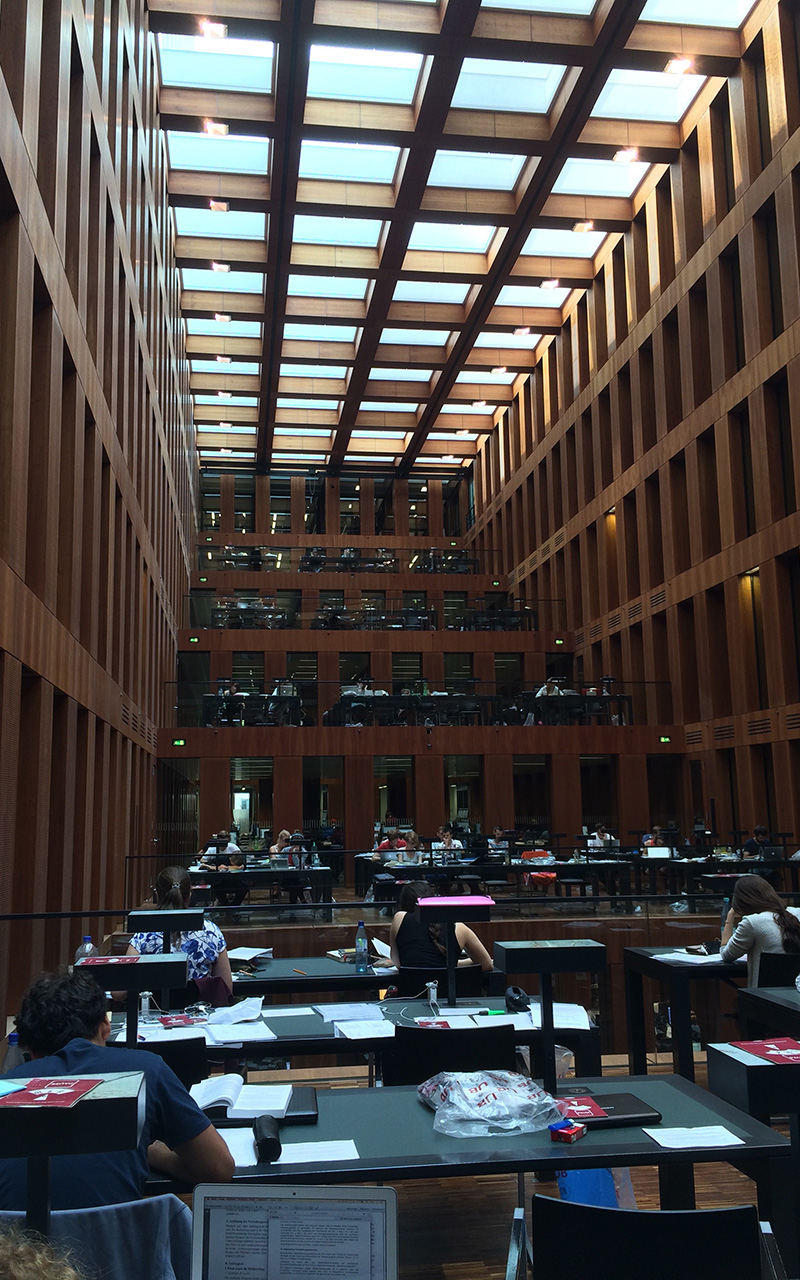July 19 - August 13, 2020
Earn five law school credits in Berlin, Germany this summer working on important refugee/asylum and police/state violence projects for leading international human rights NGOs, and discovering how Berlin’s significant
th century history informs national and international law. DePaul and Humboldt University of Berlin are hosting one of the most innovative and rewarding summer study abroad programs available—Law and Critical Social Justice.
Each course in the program incorporates Berlin as part of the “living classroom” through which students will examine major world events as they relate to law and social justice lawyering. Financial aid is available to cover tuition, airfare, lodging and meals.
Why Berlin?
This unique program features two innovative courses on Intersectionality & Human Rights, and History, Memory & Law, taught at the storied
Humboldt University of Berlin (HU-Berlin), a host institution chosen for its tradition for excellence and criticality. HU-Berlin is one of the most prestigious universities in Europe and the world. According to the latest 2018 World University Rankings by Times Higher Education magazine, HU-Berlin is the 62nd best university in overall world reputation. In addition to Albert Einstein, other notable HU-Berlin alumni and professors or lecturers include leading intellects and talents of the 19th and 20th centuries, such as Karl Marx and Friedrich Engels, Max Weber, Georg W.F. Hegel, Felix Mendelsohn, the Brothers Grimm, Walter Benjamin, Herbert Marcuse, W.E.B. DuBois, Angela Davis and Chilean President Michelle Bachelet. Students will hear from some of the most cutting-edge thinkers in law and humanities through the program’s collaboration with the Humboldt Law Clinic Grund- und Menschenrechte (HLCMR) and Center for Transdisciplinary Gender Studies (ZtG).
Why Law & Critical Social Justice?
The Law and Critical Social Justice program in Berlin allows students to gain valuable experience applying legal skills and training to assist leading NGOs in Berlin working to secure improved living conditions for refugees confronting multiple systems of subordination, or to redress police brutality and state violence for Europe’s most vulnerable populations. These high quality NGO partnerships are supported by DePaul’s
Steans Center for Community-based Service Learning. Students in the program will serve social justice while also acquiring theoretical tools, cross-cultural competencies, historical context and practical experiences that will serve DePaul students well in any legal field or career. Each course will provide unique experiential learning or praxis-based skills to develop advocacy-based careers. The program specifically seeks to explore the critical traditions in human rights law and how they relate to specific justice struggles confronting immigrants, religious minorities, communities of color, women, LGBT, and trans*people in Germany and the U.S.

Social Justice Praxis
In Intersectionality & Human Rights, students have worked with a number of prominent Berlin NGO’s. In a unique opportunity to incorporate community-based service learning in an international context, students will visit and engage the work of
ReachOut Berlin, an organization serving victims of rightwing extremist, racist or anti-Semitic violence in Berlin;
WeAreBornFree, a refuguee rights organization that includes a community resource center and radio program for refugees, migrants and friends--especially LGBTIQ people, women and children from the African continent--to gather and support one another; and
Center for Intersectional Justice, a new Berlin-based NGO that seeks to deploy human rights laws and antidiscrimination frameworks strategically to combat the multiple sources of systemic discrimination that lead to marginalization and social inequality in Europe.This study abroad program is unique in incorporating ongoing projects of Berlin-based NGO’s into classroom study, thereby providing an important social justice praxis dimension to their global engagement. This hands-on approach allows students to incorporate intersectionality theory, social justice lawyering, and antidiscrimination tools to learn how they might apply national, international and transnational laws to empower multiply subordinated subjects confronting issues of asylum, residency, and state-based police violence.
Experiential Learning
The History, Memory & Law course will utilize experiential learning to take full advantage of our siting in Berlin. Students will complement their classroom learning about comparative German and U.S. histories of colonialism, genocide and forced labor by visiting local museums, memorials and important cultural sites to see how the social construction of remembering maps onto a region’s laws, legal culture and understanding of human rights. Students will consider how lessons from historical traumas can inform contemporary strategies of inclusion and anti-subordination of minorities in Europe, the United States, or other parts of the world today. Learning by doing allows students both to observe how law functions to shape historic events (and vice versa) and to develop insights about the lawyer’s role and relationship to social justice.
The DePaul Law Advantage
Find out why the National Jurist has identified our study abroad program as one of “Four Great Places to Study Human Rights Law.” Don't wait and apply today!
Applicants are encouraged to apply by April 15, but applications will be accepted on a space-available basis through May 1.
Apply